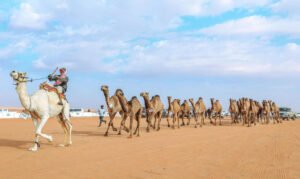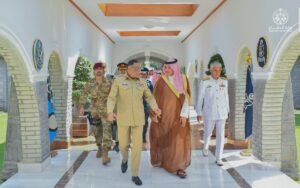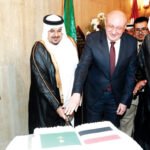
Few countries have ever undergone the kind of dramatic transformation underway in Saudi Arabia. In just a few years, Crown Prince Mohammed bin Salman has thoroughly upended cultural norms and expectations in the Kingdom. Now he’s rewriting the national narrative, sidelining the role of Islam and emphasizing Saudi nationalism, history and the royal family.
Last week the nation celebrated a new holiday, Founding Day. It identifies 1727 as the origin of Saudi Arabia. That directly challenges the traditional narrative, celebrated since the country’s modern founding in 1932, that identified 1744 as the foundational moment.
In 1727, the Al Saud clan captured the Emirate of Diriyah, an exercise in pure political and military power. The 1744 date, by contrast, commemorated on alliance between the Al Sauds and the radical puritanical preacher Muhammed ibn Abdul-Wahhab.
His literalistic and reductive interpretation of Islam, known today as “Wahhabism,” has effectively been the state religion and was the main basis for claims of domestic authority and global Islamic leadership.
That’s all been rapidly jettisoned under Crown Prince Mohammed and his father, King Salman.
As far back as 2016, the feared religious police were stripped of their practical authority over the population. And since MBS became crown prince in 2017, there has been a stunning transformation on women’s rights, gender mixing, public entertainment and the celebration of pre-Islamic Saudi heritage.
There are many factors at play.
Like many other nations, Saudi Arabia is adopting a nationalistic, populist Saudi-first narrative that emphasizes domestic concerns over religious and pan-Islamic issues.
But the centrality of religious authority also needed to go to facilitate a badly needed transition to a post-energy economy. Saudi citizens have to be transformed from wards of the state to wealth-producing citizens. And that can’t be done without greater personal freedom, especially for women now empowered to work, drive and operate with much more independence.
Saudi Arabia has decided to try to elevate tourism and entertainment into the second-largest sector of the economy after oil. Part of this is a drive for domestic tourism, an effort to dissuade Saudis and their cash from leaving the country every time they want to enjoy themselves. But it’s also a pitch for international non-religious tourism. There’s even speculation that alcohol could be legalized in certain places to promote that industry.
To the religious conservatives accustomed to holding sway over social mores, this is all anathema. But they have been dramatically cut down to size. And now even their role in the narrative of national identity is being rapidly obliterated through Founding Day and the rewriting of Saudi history.
The third reason that religion has to be displaced is that this remarkable social liberalization and planned economic diversification is being accompanied by an equally intense political constriction and repression.
Such transformations, especially when imposed by monarchs of traditional societies, have often unleashed forces rulers were unable to contain. Examples of royals who ended up being overthrown in the wake of such changes include Haile Selassie in Ethiopia in 1974 and the Shah of Iran five years later.
In order to contain and limit the threat of political backlash, King Salman and MBS have centralized power and ruthlessly cracked down on dissent.
Saudi Arabia no longer resembles the neo-feudal patronage regime of the past, and of other Gulf Arab monarchies. Power was traditionally dispersed within different sectors of the royal family. Now authority has been concentrated in the hands of the king and the crown prince and a small group of officials and advisers.
That’s been accompanied by waves of political repression that has included the Ritz-Carlton detentions of wealthy and prominent Saudis, the 2018 murder of journalist Jamal Khashoggi in the Saudi consulate in Istanbul, the detention and abuse of women’s and human rights activists and an atmosphere of terror, particularly among elites that prospered under the old order and therefore might be most resistant to change.
As Saudi political scientist Sultan Alamer notes, the new Saudi nationalist narrative is more socially inclusive than the old Wahhabi one, but it’s also more politically authoritarian.
That sums up the gamble that MBS is taking: that he can radically liberalize his country culturally and economically but remain in power by concentrating power and authority in his own hands. It’s among the most audacious political projects in the world. It’s also one of the riskiest.







